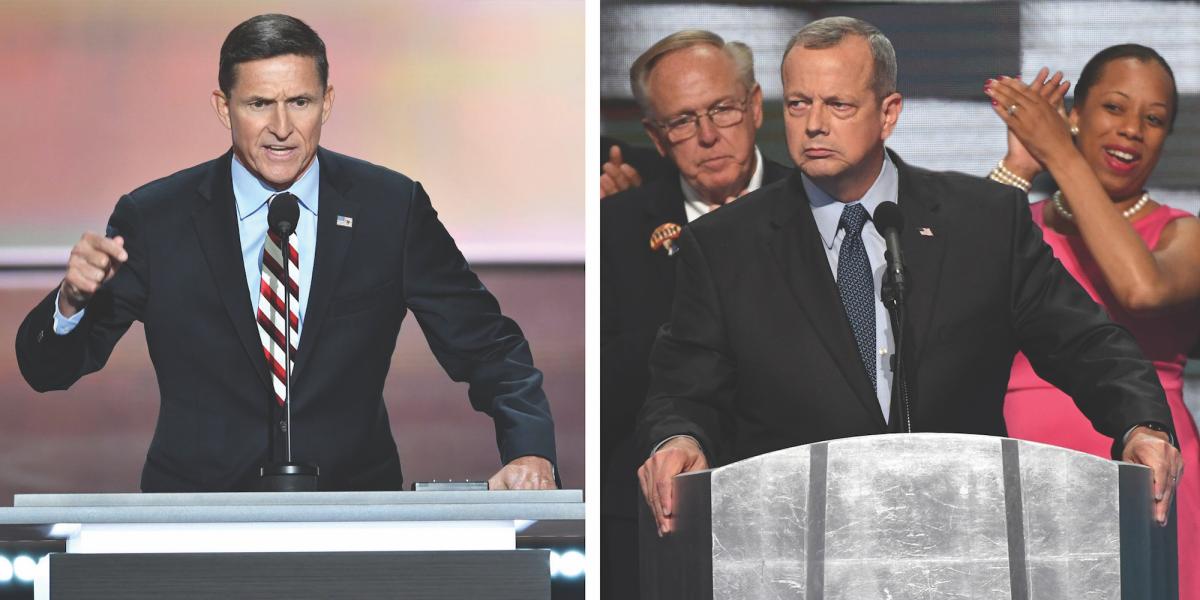“It is always dangerous for soldiers, sailors or airmen to play at politics. They enter a sphere in which values are quite different from those to which they have hitherto been accustomed”
-Winston Churchill
In November 2015, I wrote a Proceedings commentary titled, “Admirals (and Generals) For Life,” in which I implored my fellow retired flag and general officers to avoid public endorsements of presidential candidates in the 2016 campaign. Why? Because when introduced as an admiral or general while making a political endorsement, a retired military officer can easily give the American public the impression its military leaders are part of the partisan political process.
How well did retired flag officers avoid such political perils? Not well. Many of us remember two glaring examples. At the Republican convention in July 2016, a retired Army lieutenant general gave not only a very public endorsement of the Republican presidential candidate, but also an angry political rebuke of the Democratic candidate including leading the convention in cheers of “Lock her up!” At the Democratic party convention two weeks later, another retired general introduced himself as, “a retired four-star general of the United States Marine Corps, and I am joined by my fellow generals and admirals” who were aligned behind him at the podium. Although his comments focused primarily on why the Democratic party candidate would be a good president, his delivery was off-putting to many as he shouted out his speech over the roar and confusion of the convention crowd.
What did the American public take away from these two political speeches by retired flag officers? It is hard to tell with certainty, but it is not too far of a stretch to believe that for many watching these two convention performances, the military was seen as just another partisan political entity. It can be difficult for the public to discern the difference between when we are speaking as admirals and generals and when we put that perspective aside to speak purely as private citizens. It is not a large step from these concerns about blurred political lines in our retired flag and general officer community to concerns by political leaders and the public about the politics of active-duty military leaders. That is a path I think we all can agree we, as a nation, do not want to go down.
Another worry is retired flag officers making public, critical, and seemingly partisan statements, not about issues, but about our political leaders. Much like convention speeches, such statements can send an unhealthy signal to our active-duty force. As former Chairman of the Joint Chiefs Admiral Michael G. Mullen pointed out at the U.S. Naval Institute–U.S. Naval Academy history conference “Military and Politics: Proper Participation or Perilous Partisanship” in October 2017, “One of the real deleterious impacts of this is that we are training our young that this is okay” and those who do so “are actually damaging the profession to their own benefit.”
I have had a similar concern for many years. Shortly after President Clinton was inaugurated in early 1993, one of the first initiatives from the White House was to open military service to gays, bisexuals, and lesbians. A few retired flag officers openly opposed this initiative and some even made derogatory comments about President Clinton including calling him a “draft dodger” because of his lack of military service and multiple education draft deferments. While this discussion was going on publicly, I was in command of a destroyer in Norfolk. One Friday evening our wardroom had a traditional dining out—all in dinner dress uniforms accompanied by our spouses and dates. As is tradition, the first toast of the evening was to the Commander-in-Chief [the President]. We all stood, glasses raised, and said in unison “to the Commander-in-Chief.” One of my division officers remained seated during the toast and blurted out that he wasn’t about to toast this President.
After the event, so as not to spoil the evening for our guests, I told the young division officer to meet me the next morning. When he arrived, I told him to give me his collar devices [rank insignia] since he couldn’t support the Commander-in-Chief, and only if he did so would I respect his decision not to participate in the previous evening’s toast. He was quite shocked by this, hemmed and hawed for a moment, and then apologized for his actions. He sheepishly said he had read many of the op-eds and press reports criticizing President Clinton, and he admitted his arrogance had gotten the better of him. This young division officer continued to serve on the ship and serve well, but not until he had apologized to every other officer in the wardroom.
So, do we as retired flag and general officers have the right publicly to endorse presidential candidates? Yes. Do we have the right to make public statements denigrating our political leaders? Yes, we have that right, too, but I believe that to do either is not good for the health of our democracy. Our nation—including our military—has long prided itself on having an apolitical military.
In August of this year, General Joseph Dunford, U.S. Marine Corps, then the 19th Chairman of the Joint Chiefs, said, “I will not now, nor will I when I take off the uniform, make judgments about the President of the United States or the Commander-in-Chief. I just won’t do it”.
In my opinion, that is sage advice for all retired generals and admirals.



